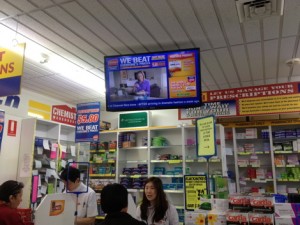An Interview With Jeremy Copp, CEO, @ONELAN_ltd
Gail Chiasson, North American Editor
ONELAN, headquartered in the tranquil town of Henley-on-Thames about 45 minutes outside of London, UK, seems to be entering a new era with the recent appointment of Jeremy Copp as CEO.
While we knew that the company was growing – in fact, it was #10 in The Top 25 Digital Signage Software Vendors report in 2016 – it seems that it might have been growing faster than we realized.
And it has all been organic growth at this privately-owned company that has had no outside investment.
It is owned by the company management and the widow of the late founder David Dalzell. (Although the majority owner, she is not active in the company.)
Dalzell, who died in early 2013, had founded the company in 1988, developing high-speed data networking products for both commercial and military customers, than, as a pioneer in the digital signage business, moving into Net-top-boxes in 2000.
“We still have Net-top-boxes, along with all sorts of digital signage and IPTV solutions,” said Copp.
In fact, ONELAN has become more or less a one-stop shop, with a permanent staff of about 38, full production facility on site, with offerings of manufacturing, production, operations, maintenance and support. It partners with others, especially onemedia, also in Henley, for creative services as required. And it is now building a full marketing team headed by Hugh Coghill-Smith, sales and marketing director.
Since many of the articles that we’ve written about the company have been about smaller, often local, deployments by ONELAN, it’s always surprising to learn its size and scope.
ONELAN has over 300 partners in 50 countries. Its biggest deployment is Chemist Warehouse, a pharmacy chain in Australia with approximately 2,000 Onelan screens.
ONELAN also has offices in Germany, serving Europe; China serving China and the rest of Asia; and South America; and is now opening an office in North America, this latter in the Denver, Colorado area. (A person to head that office has not been announced yet.)
“They’ve all been opened because of demand from clients and potential clients,” said Copp. “It’s not unusual to see us pitching for clients against companies like BroadSign and Scala now. Our advantage is the robustness of our products. An example is in Dubai Duty Free where our Content Management System and players are powering hundreds of screens throughout the duty free retail area to deliver a high quality 24/7 advertising network that has operated continuously trouble-free for nearly three years. The robust quality of our products is our biggest advantage.”
Copp, who only officially joined the company a month ago, seems to have become up-to-speed quickly.
“My past career has been mainly been building startups and growing other companies from various executive positions,” Copp said. “After starting my career designing graphics, I’ve worked in mobile, mobile application development, audience metrics, big data metrics, telecom, and licensing software.
“My learning goes back a long way. It all came together at ONELAN. I have lots of experience aggregating, putting together market strategies and product strategies and rolling them with corporate growth strategies.
“ONELAN offers clients the ability to integrate with other backend solutions. We have cost-effective ways of delivering optimization. And, of course, the robustness of our products is a huge advantage. Both Samsung and LG are among our partners.”
ONELAN partnered with Samsung to develop software solutions which integrate Onelan’s enterprise Content Management System with the Samsung Smart Signage Platform. And ONELAN has developed a software solution to allow LG Web OS smart displays to integrate with the ONELAN CMS. These displays can be managed alongside ONELAN Net-Top-Boxes in a mixed network environment.
“We are ready to accelerate our growth in new markets,” said Copp. “North America is an example. We’ve been operating there quietly for seven or eight years, but now will have an office there and we’ll talk about our integrated solutions, our ability to offer all our software and other solutions and delivery and support – and, of course, the robustness of our products.”
North America is not unknown to Copp himself. In one of his previous positions, he spent one week per month for six or seven years in San Francisco.
One of the products that Copp thinks the North American market – and elsewhere – will be interested is its updated Reserva system. Expected to be of interest especially to the education, hospitality and corporate sectors, Reserva Room Signage not only has an updated hardware platform but supports leading university timetabling systems. We asked Copp what makes Reserva so different from any other meeting room signs on the market.
“It’s the fact that anyone can reserve a room right on the sign,” he said. “You might be checking out which rooms are empty for a special class or meeting. When you find a room that’s not being used or that a boardroom that isn’t booked, you can book it yourself right on the sign. The information can also be integrated immediately with digital signage at, for example, the reception area so people not only know that room is now booked, but people attending the class or meeting also know where to go.”
ONELAN’s System-on-a-Chip is one of its products that is interesting for the retail markets. It’s particularly interesting for retailers who want to have and connect a lot of displays.
Scalability is a strong point with ONELAN, and its clients recognize this. Among them are the BBC and the Bank of England.
“About one-third of our business is now in retail; a significant portion is in the educational sector; and the rest is in corporate information displays,” said Copp, who sounds as confident and knowledgeable about the company as if he had been there several years. “We have our own software, so we’ve always been in control.”
“Our products are sold through distributors and retailers but carry the ONELAN branding.”



Follow DailyDOOH